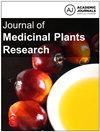Analgesic, anti-inflammatory and oxytocic activities of Dracaena steudneri Engl. stem bark aqueous extract in Wistar rats
引用次数: 0
Abstract
Dracaena steudneri Engl. (Dracaenaceae) is a medicinal plant that is used in labour by traditional birth attendants to induce labour, relieve pain and treat various diseases; albeit no documentation. This study determined the analgesic, anti-inflammatory and oxytocic effects of the D. steudneri stem bark aqueous extract. D. steudneri stem bark was collected, authenticated, oven-dried at 45ºC for 48 h, pulverized and extracted using the decoction method. The analgesic effect of the aqueous extract was determined using the acetic acid writhing test, anti-inflammatory activity was determined using paw oedema method while oxytocic activity was determined using abortion and other standard test procedures and were tested at 12.1 24.1 and 48.2 mg/kg. The results of the analgesic study showed that the extract reduced the number of abdominal writhing between 53.51 and 92.40% at 6.02 and 48.2 mg/kg dose, respectively while the standard drug showed a reduction of 36.58% at 10 mg/kg. The anti-inflammatory results showed percentage inhibition of 18.6% (2 h), 22% (2 h) and 18.9% (6 h) at 12.1, 24.1 and 48.2 mg/kg, respectively. The in vivo oxytocic activity showed average time taken for the rats to deliver was between 20.63 h at lowest dose (12.1 mg/kg) and 8.25 h at highest dose (48.0 mg/kg) while Oxytocin the reference drug exhibited, 22 h as the average time taken for delivery. in a set of data was analyzed through the one- way Analysis of Variance and the difference among the means was considered at 95% confidence level using the post-hoc method of Newman-Keuls.龙血树的镇痛、抗炎和催产素活性。Wistar大鼠的树皮水提取物
德国龙血树。(龙血树科)是一种药用植物,传统助产士在分娩时使用它来引产、止痛和治疗各种疾病;尽管没有文件。本研究测定了炖牛蒡茎皮水提取物的镇痛、抗炎和催产作用。D.收集、鉴定、在45ºC下烘箱干燥48小时、粉碎并使用煎煮法提取。使用乙酸扭体试验测定水提取物的镇痛作用,使用爪水肿法测定抗炎活性,而使用流产和其他标准试验程序测定催产素活性,并在12.1、24.1和48.2 mg/kg下进行试验。镇痛研究结果表明,在6.02和48.2 mg/kg剂量下,提取物可分别减少53.51%和92.40%的腹部扭体次数,而标准药物在10 mg/kg剂量下可减少36.58%。抗炎结果显示,在12.1、24.1和48.2 mg/kg时,抑制率分别为18.6%(2 h)、22%(2小时)和18.9%(6 h)。体内催产素活性显示,大鼠在最低剂量(12.1 mg/kg)下的平均分娩时间为20.63小时,在最高剂量(48.0 mg/kg)下为8.25小时,而对照药物催产素的平均分娩时长为22小时。在一组数据中,通过单向方差分析进行分析,并使用Newman-Keuls的post-hoc方法在95%置信水平下考虑平均值之间的差异。
本文章由计算机程序翻译,如有差异,请以英文原文为准。
求助全文
约1分钟内获得全文
求助全文

 求助内容:
求助内容: 应助结果提醒方式:
应助结果提醒方式:


